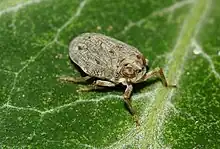planthopper
English

Issus coleoptratus, a planthopper
Noun
planthopper (plural planthoppers)
- Any of many insects, of superfamily Fulgoroidea, that bear a remarkable resemblance to leaves and are capable of prodigious leaps.
- 1997, Rosamond L. Naylor, Paul R. Ehrlich, Chapter 9: Natural Pest Control Services and Agriculture, Gretchen Daily (editor), Nature's Services: Societal Dependence On Natural Ecosystems, page 156,
- Cumulative losses from the brown planthopper have been estimated in the hundreds of millions of dollars (Denno and Perfect 1994) and accounted in 1990 for some 6 percent of the total value foregone from all biotic and abiotic factors that reduce rice production (Herdt 1991).
- 2000, E. M. Craddock, “1: Speciatio Processes in the Adaptive Radiation of Hawaiian Plants and Animals”, in Max K. Hecht, Ross J. MacIntyre, Michael T. Clegg, editors, Evolutionary Biology, volume 31, page 20:
- The sap-feeding planthoppers (Homoptera: Fulgoroidea) are ubiquitous in virtually all Hawaiian terrestrial ecosystems.
- 2011, Ross Piper, Pests: A Guide to the World's Most Maligned, Yet Misunderstood Creatures, page 130:
- Planthoppers begin life as eggs deposited in fissures on the surface of their host plant or even beneath the bark.
- 1997, Rosamond L. Naylor, Paul R. Ehrlich, Chapter 9: Natural Pest Control Services and Agriculture, Gretchen Daily (editor), Nature's Services: Societal Dependence On Natural Ecosystems, page 156,
Translations
a type of insect
|
See also
This article is issued from Wiktionary. The text is licensed under Creative Commons - Attribution - Sharealike. Additional terms may apply for the media files.